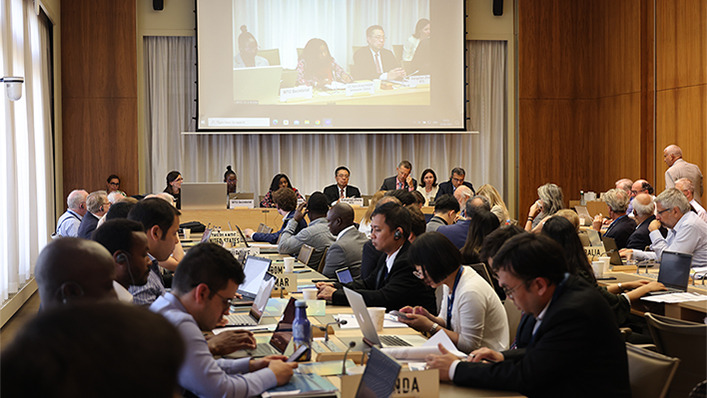Exploring pathways for LDC integration into global trade
International trade is key to unlocking the potential of least-developed countries (LDCs) and enabling them to achieve their socio-economic development ambitions.
To achieve the goals of the Doha Programme of Action for the Least Developed Countries for the Decade 2022-2031, it is also essential that LDCs increase their participation in international trade.
However, if LDCs are to reap the maximum benefits from trade — and from their membership of the World Trade Organization (WTO) — they must be more fully integrated into the multilateral trading system.
To achieve this, new ways for LDCs to engage proactively in WTO activities must be identified, and LDCs’ international partners must collaborate on LDC priorities and provide them with targeted support.
A new collection of essays, titled “LDCs and the multilateral trading system”, sheds light on the current challenges facing LDCs and makes practical proposals on how LDCs can seize the opportunities provided by trade.
The authors' views were discussed at an event held on the sidelines of the Annual Conference of the WTO Chairs Programme currently taking place at the WTO's headquarters in Geneva.

The authors made the following recommendations:
1. Assist LDCs in their implementation of WTO rules
- It is important to support LDCs as they work toward implementation of WTO rules, adopting a gradual approach and building on support provided under the WTO Trade Facilitation Agreement (TFA).
- In addition, LDCs could make more active use of opportunities offered by the Aid for Trade initiative.
- The inclusion of a chapter on implementation and trade costs in LDC trade policy reviews would help LDCs when they request necessary assistance with trade capacity-building.
- WTO members that wish to adopt higher standards — which LDC exporters may struggle to satisfy — could provide support for LDCs to help them meet the regulatory standards and adjust to the evolving trading conditions.
- LDCs and their development partners should view the WTO’s 13th Ministerial Conference (MC13), planned for February 2024, as an opportunity to shape more robust and impactful support for LDCs.
2. Make WTO work easier for capital-based officials from LDCs
- LDC policymakers would benefit from contributing to WTO reform debates, especially on proposals to improve transparency and monitoring of WTO members' trade measures. LDCs make little use of the opportunities provided by WTO committees to raise trade concerns or to pose questions. This may be due in part to LDC capacity constraints and to the small size of LDC delegations in Geneva.
- LDC delegations might find it easier to engage in WTO activities if information sessions were organized with officials in LDC capitals to help them understand how they might make greater use of existing digital tools, such as virtual meetings, eRegistration and the Trade Concerns Database.
- In addition, the organization of “experience-sharing” sessions could enable LDCs to learn from each other.
- Finally, by providing the LDC Group with regular briefings by the WTO Secretariat and sharing information with them about different streams of work in the WTO, it would be easier for LDC delegations to engage in WTO work.
3. Support LDC participation in trade discussions
- LDCs have been hesitant to participate in the various “joint statement initiatives” being pursued by groups of WTO members. They may have concerns that they could struggle to participate on an equal footing with other members in such discussions, partly because of administrative capacity constraints and limited knowledge of the subject matter.
- However, LDC participation in these discussions could be supported in a number of ways.
- Assistance could be offered, for example, to non-participants in the initiatives who would like to take part in the discussions but are unable to do so because of capacity constraints.
- The engagement of domain-specific communities with extensive knowledge of policy areas, institutional issues and the situation in LDCs and developing economies could be helpful.
- A multi-donor facility could be created to fund support and strengthen the engagement with LDCs in building cooperation on good practices — for instance, to facilitate access to finance for small businesses or to foster regulatory cooperation in the area of digital trade.
4. Identify areas in which LDCs can champion their own interests
- The commercial interests of LDCs are insufficiently reflected in WTO Agreements, partly because the negotiating strategy of LDCs at the WTO has mostly focused on obtaining exceptions to global rules.
- A better strategy for LDCs could be to take an offensive — rather than a defensive — approach to pursuing their commercial interests in trade negotiations.
- Thus, LDCs should take a proactive approach, including through cooperation with firms, in response to different sustainability requirements.
- LDCs should form coalitions of interest with other WTO members, as this could help them to achieve quicker negotiating wins.
- Making greater use of new technologies, including machine learning and big data, could help to identify the most vulnerable members and those who need greater support with their efforts to integrate into world trade.
These views do not, of course, reflect WTO members' positions, but it is hoped that they will help to stimulate lively debate about how LDCs can play a more active role in shaping trade rules and in contributing to reform of the WTO.
